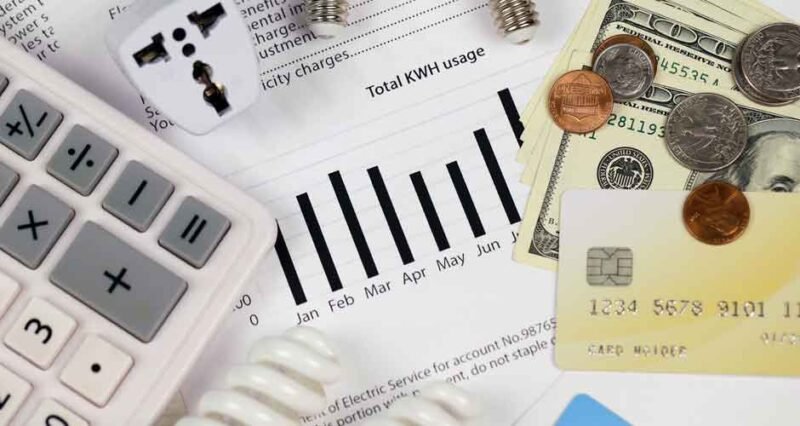
As consumers, we are all looking for ways to save money on our energy bills. One option that many energy providers offer is a fixed energy tariff. This type of tariff locks in the price you pay for your energy for a set period, usually one to three years. The idea is that this will protect you from rising energy prices and provide budget certainty. However, fixed tariffs can come with drawbacks, such as exit fees and the potential to miss out on lower energy prices if they drop during the fixed period. Find out more by reading our in-depth analysis of the benefits and drawbacks of fixed energy tariffs.
Predictable Bills With Fixed Tariffs
One of the most significant benefits of fixed energy tariffs is the predictability of bills. With a fixed tariff, energy consumers can rest assured that they will pay a fixed amount each month, regardless of fluctuations in the energy market. This predictable billing can provide significant peace of mind to consumers who want to avoid the financial uncertainty that can come with variable tariffs.
Additionally, fixed tariffs can help consumers to budget more effectively, as they know exactly how much they will be paying each month. This can be particularly helpful for households on a tight budget who need to plan their finances carefully.
Protection Against Energy Price Hikes
Fixed tariffs provide customers with the assurance that the price they pay for their energy will remain the same for a set period of time, typically ranging from one to three years. This means that customers can budget more effectively, and are shielded from sudden increases in energy prices that often occur in the volatile energy market.
Additionally, fixed tariffs offer greater transparency, as customers can easily compare the costs of different tariffs and choose the one that best suits their needs. This can help to promote competition among energy suppliers and lead to lower prices for consumers.
Budgeting Made Easier for Consumers
By signing up for a fixed energy tariff, consumers can know exactly how much they will be paying for their energy bills each month. This allows consumers to plan their finances more effectively and avoid any unexpected expenses related to energy costs.
Additionally, fixed energy tariffs often offer lower rates than variable tariffs, which can help consumers save money in the long run. However, it is important to note that fixed energy tariffs may not be suitable for everyone, as they often come with penalties for early termination or changes to the contract. Consumers should carefully weigh the benefits and drawbacks of fixed energy tariffs before making a decision.
Limited Flexibility in Switching Providers
While fixed tariffs may protect consumers from sudden price hikes, they also lock them into a contract for a set period of time. This means that consumers cannot switch providers or tariffs without incurring early termination fees or penalties. As a result, consumers may miss out on better deals or lower prices offered by other providers during the fixed term. Additionally, the lack of flexibility may cause frustration for consumers who may want to switch providers for other reasons, such as poor customer service or a desire to support a more environmentally-friendly company.
Risk of Overpaying if Usage Decreases
When you sign up for a fixed tariff, you are agreeing to pay a set price for your energy for a specific period of time. This means that if your energy usage decreases during that time, you may end up overpaying for your energy. While some fixed tariffs allow you to adjust your usage and pay less, others do not offer this option.
It is important to carefully consider your energy usage patterns before committing to a fixed tariff to ensure that you are not paying more than you need to. Additionally, it is important to read the terms and conditions of the tariff carefully to understand the potential penalties for breaking the contract early if your usage decreases significantly.
Higher Fixed Rates Than Variable
One of the key advantages of fixed tariffs is that they often offer higher fixed rates than variable tariffs. This means that customers who opt for a fixed tariff can enjoy greater price stability and predictability, with no sudden spikes in their energy bills. Additionally, higher fixed rates can provide customers with peace of mind, knowing that they won’t have to worry about unexpected changes to their energy bills due to market fluctuations or other factors outside of their control.
Potential Exit Fees for Switching
One of the potential drawbacks of fixed energy tariffs is the presence of exit fees for switching to another energy supplier before the end of the fixed term. These fees are typically charged to customers who wish to switch their energy supplier or tariff before the end of the agreed-upon contract period. The amount of the fee can vary depending on the supplier and the terms of the contract, but it is often a significant cost that can discourage customers from switching to a better deal.
It is important for consumers to carefully review the terms and conditions of a fixed tariff before signing up, including any potential exit fees, in order to make an informed decision about their energy supply. While exit fees are not always present in fixed energy tariffs, the possibility of incurring them should be weighed against the potential benefits of a fixed-rate contract.
Long-Term Commitment to Tariff
Long-term commitment to a fixed energy tariff has both benefits and drawbacks. One of the benefits is the assurance of a consistent and predictable energy bill, which can help with budgeting and financial planning. This can be particularly helpful for households on a tight budget or for businesses that need to manage their expenses closely.
However, the drawback is that committing to a fixed energy tariff for a long period of time means that you may miss out on potential savings if energy prices decrease during that time. Additionally, if you need to terminate the contract early, you may be subject to termination fees or penalties. It’s important to carefully weigh the pros and cons before deciding on a long-term commitment to a fixed energy tariff.
Conclusion
Fixed energy tariffs offer peace of mind for consumers who want to avoid sudden price hikes and want to budget their finances effectively. However, it’s important to weigh the benefits and drawbacks before deciding on a fixed tariff. While they provide stability, they may not always be the most cost-effective option for everyone’s needs.
It’s important to consider factors such as the length of the fixed term, potential exit fees, and overall energy usage before making a decision. In the end, it’s up to each individual to decide which energy tariff suits their needs and preferences best.

